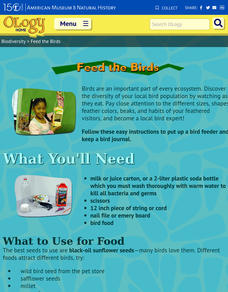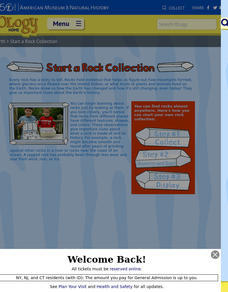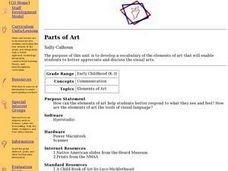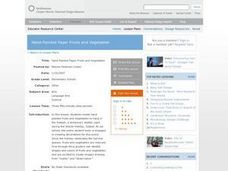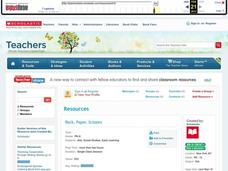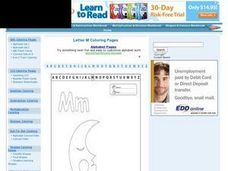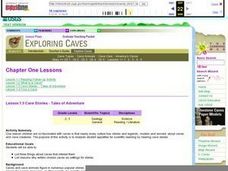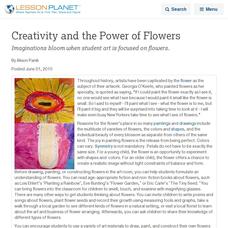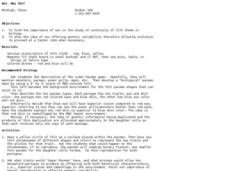Curated OER
Conservation in Small Spaces: Butterfly Life cycles
Students discuss ways that butterflies and moths change during their lifecycles, observe caterpillars, and explore how their different body parts work.
Curated OER
How to Hide in the Ocean
Young scholars observe and discuss the advantages of camouflage, then try their hands at designing a well-camouflaged fish.
Curated OER
It Just Keeps Going and Going...
Students explore patterns, identify patterns, and complete a variety of patterns. They view and discuss an online video and identify the different patterns from the film, then using a hundreds grid create an original pattern using their...
Curated OER
Good Apples
Students investigate diversity. In this diversity lesson, students look at a variety of apples in order to compare and contrast their physical characteristics. They apply the concept to people by listing how people are the same and...
Curated OER
All About Seeds!
How do fruits relate to flowers and seeds? Identify the seeds and their purpose with a coloring activity for kindergartners. Once they color the seeds of apples, bananas, and peas (among others), kids get hands-on experience with bean...
Curated OER
A Math Board Game
Math is fun with a board game printable set. After printing the pieces and board for the game, have your kids play in groups to practice concepts such as operations and arithmetic formulas.
American Museum of Natural History
Feed the Birds
What kinds of birds are common in the area? Young scientists use household supplies to create bird feeders. They then document the birds that come to their feeders by keeping journals.
American Museum of Natural History
Start a Rock Collection
Rocks hold evidence of Earth's past. A three-step guide describes the process of creating a rock collection. It provides a data collection sheet to make notes about each sample.
American Museum of Natural History
Piecing It All Together
Archaeology digs are much like giant jigsaw puzzles. The artifacts found are often in pieces and scientists must reconstruct them. A hands-on activity lets young archaeologists experience this facet of the job as they create, smash, and...
American Museum of Natural History
Feed the Birds
Scholars use a large carton, string, an emery board, and bird food to create a hand-made bird feeder. After completing the craft, pupils keep a journal to track their observations.
Curated OER
Parts of Art
Young scholars define and use new vocabulary associated with the elements of art. As a class, they brainstorm different ways in which we communicate with one another. In groups, they view different pieces of art from the Native American...
Curated OER
Hand-Painted Paper Fruits and Vegetables
First graders create hand painted fruits and vegetables to hang in the Sukkah, a temporary shelter used during the Jewish Holiday, Sukkot. They are excited about the creation of the works of art and the lesson engagement is high being...
Curated OER
Rock, Paper, Scissors
Students build rock sculptures, In this hands-on art instructional activity, students pile rocks into unique formations to create rock sculptures.
Curated OER
Alphabet Coloring Page: Letter Mm
In this alphabet coloring worksheet, students identify the uppercase and lowercase letter Mm. Students color the image and words for the moon.
Curated OER
Mathematics of Fair Games
Students examine mathematicians' notion of fairness in games of chance. They work in pairs to perform three different experiments using macaroni and paper bags. They record their results on charts and compare their data.
Curated OER
Name that animal
A great way to classify organisms, is by counting the number of legs it has or how it moves. Little ones count the legs on five different creatures, then match the leg count to the proper animal name. Tip: Have them come up with other...
Curated OER
Idiom
In this idioms worksheet, students write meanings of the idioms provided to them. Students complete 20 idiom meanings on this worksheet.
Curated OER
Cave Diagram
Learners examine limestone cave geology and hydology. They study cave vocabulary.
Curated OER
Cave Stories - Tales of Adventure
Students list three things about caves that interest them and list reasons why writers choose caves as settings for stories.
Curated OER
Follow a Fish
Learners choose a fish from anywhere within the Ocean Center. They observe it for a given time, recording its behavior. Students comprehend the concept that living things have individual characteristics that enable them to live in their...
Curated OER
Creativity and the Power of Flowers
Imaginations bloom when student art is focused on flowers.
Curated OER
Creating Musical Notation
In this creative music activity from Scientific American, students learn about musical notation and then design their own notations. Great web resource links are alsp provided
Curated OER
But, Why Sex?
Students investigate the importance of sexual reproduction in evolution. In this sexual reproduction lesson plan, students simulate species with two traits: eye and skin color. They determine what characteristics are beneficial for the...
Curated OER
Mandala Art Lessons
Mandala art lessons provide easy and fun ways to learn about art, math, and other cultures.








